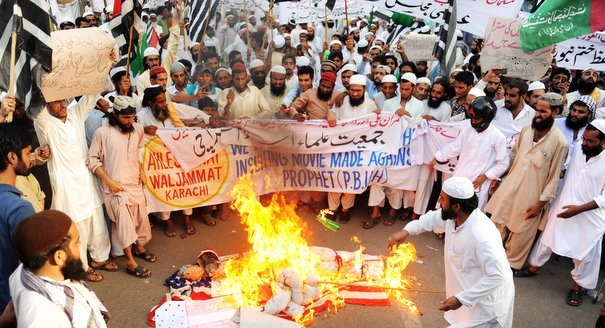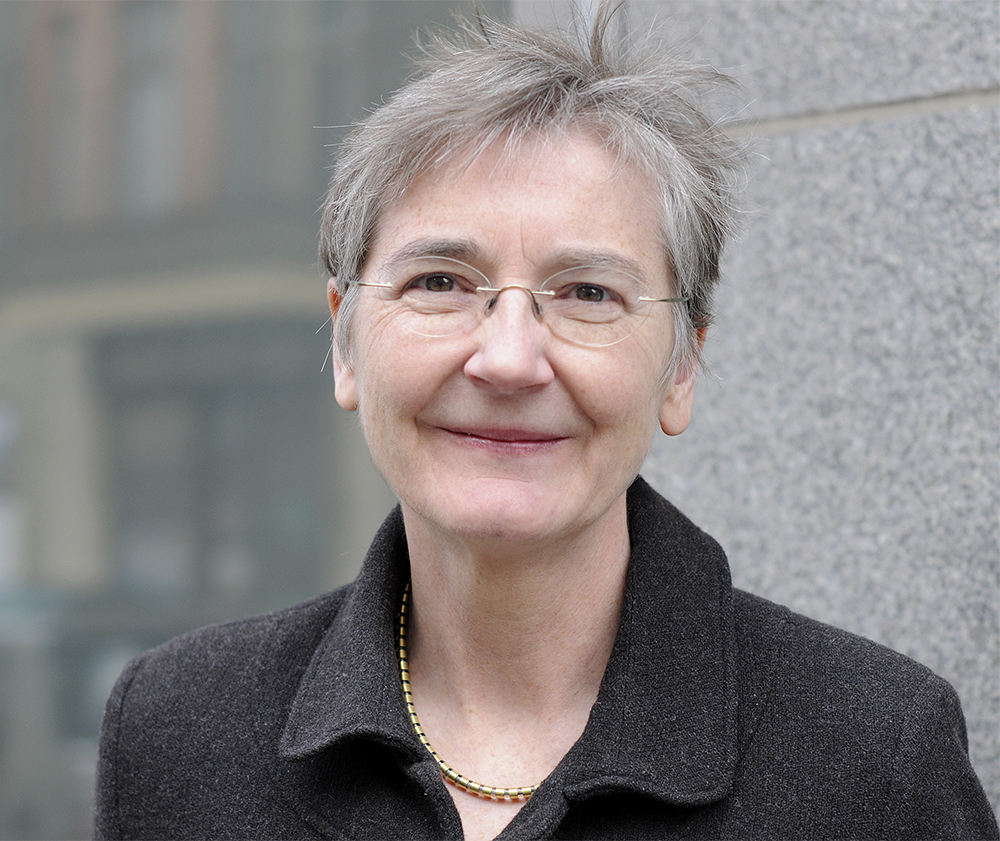Judy Dempsey
{
"authors": [
"Judy Dempsey"
],
"type": "commentary",
"blog": "Strategic Europe",
"centerAffiliationAll": "",
"centers": [
"Carnegie Endowment for International Peace",
"Carnegie Europe",
"Malcolm H. Kerr Carnegie Middle East Center"
],
"collections": [],
"englishNewsletterAll": "",
"nonEnglishNewsletterAll": "",
"primaryCenter": "Carnegie Europe",
"programAffiliation": "",
"programs": [],
"projects": [],
"regions": [
"Egypt",
"Middle East"
],
"topics": [
"Political Reform",
"Security",
"EU"
]
}
Source: Getty
Obama and Morsi: Two Views of Freedom
European leaders should take note from Obama and Morsi, who tried to address the complex issue of freedom of speech at a time when the Arab world is going through immense turmoil.
This past Tuesday President Barack Obama delivered one of his most thoughtful speeches for many months when he addressed world leaders attending the annual United Nations General Assembly. He gave a passionate defense of freedom of speech.
His speech came in the wake of anti-American demonstrations and violence across the Arab world which left at least 51 people dead. With the riots, Muslims vented their anger against the anti-Islam film that was posted on YouTube earlier this month.
Because the film was made in the United States and not immediately banned by the U.S. government, the demonstrators equated it with the American government. This says as much about the lack of understanding of Western societies as about the depth of anti-American feeling across the Arab world.
Before the Arab Spring, the press across the region, with the exception of Lebanon, had been largely censored. Freedom of speech was highly restricted. Any time that cartoons appeared in the Egyptian media showing denigrating caricatures of, for example, Jews, you can bet they were sanctioned by the regime.
When the Arab Spring erupted, it unleashed freedom in a way that Europeans have lost a sense or memory for. This new freedom benefited people such as Egyptian President Mohamed Morsi and his Muslim Brotherhood movement. Without that freedom, Morsi would not be addressing the United Nations General Assembly this week. Like Obama, he too brought up the issue of freedom of expression. Yet both leaders came from very different perspectives.
Obama had no hesitations over defending freedom of expression and resisting calls to ban the video.
Americans have fought and died around the globe to protect the right of all people to express their views, even views that we profoundly disagree with,” he said.
We do so because in a diverse society, efforts to restrict speech can quickly become a tool to silence critics and oppress minorities…the strongest weapons against hateful speech is not repression; it is more speech—the voices of tolerance that rally against bigotry and blasphemy and lift up the values of understanding and mutual respect.”
This section of Obama’s speech conveyed the message to the Arab world that freedom of speech is not cultural, that it should not be used as a cultural war between religions, and that is not about a single culture seeking dominance. Freedom of speech is a universal right.
Morsi had a more nuanced view.
Speaking on Tuesday at a philanthropic meeting hosted by former U.S. president Bill Clinton, Morsi seemed to link press freedom to the idea of a single culture—presumably Western and Christian—seeking dominance.
The world cannot become one culture or one civilization. However, can we have civilizations that live side by side, not against one another? It is possible,” he said. “Maybe a joke in one country is not funny in another country. That’s the nature of culture.”
Then he referred directly to the video denigrating the Prophet Muhammad.
Morsi said freedom of expression “comes with responsibilities especially when it has serious implications for international peace and security.”
He did not spell out the responsibilities. Nor did he mention that leaders in the region could have spoken out more strongly, and earlier, against the violence.
Yet there were many moderate Muslims trying to be heard who could not compete with the populist Islamists.
The rector of the Grand Paris Mosque, Dalil Boubakeur opposed the violence but got little coverage.
Mehmet Görmez, the head of Turkey’s Religious Affairs Directorate which is the country’s highest Islamic authority said: "No matter how base, banal and provocative the film might be, there is absolutely no justification in the Islamic faith for Muslims to attack embassies and murder people who are not involved."
One of the most trenchant and hard-hitting responses to the film and the violence was an essay published last week by Tariq Ramadan, Professor of Contemporary Islamic Studies at the Oxford University (Oriental Institute, St Antony’s College) who also teaches at the Oxford Faculty of Theology.
In his “Appeal to the Contemporary Muslim Conscience" Ramadan makes two main points: The first is how some individuals in the West make “cynical use of the noblest of values—freedom of speech—to attain the most poisonous objectives, promoting hatred, racism and contempt.”
These individuals, argues Ramadan, are ignorant of the societies they mock. They pretend to celebrate critical intelligence and wit at the expense of a religion practiced by much less fortunate people.
“Behind the celebration of freedom hides the arrogance of ideologists and well-fed racists who feed off the multiform humiliation of Muslim peoples,” writes Ramadan.
Ramadan, incidentally, had his U.S. visa revoked in 2004 on the grounds that he had supported Palestinian charities with ties to Hamas. He was allowed enter the United States only in 2010.
Ramadan’s second point is about how, in Muslim-majority societies, the elites, the leaders, and Muslim scholars and intellectuals should play a leading role in heading off explosions of anger and mob violence. That means focusing on education and working towards a deeper understanding of Islam.
Today’s Muslim religious scholars, he says, are caught up in ideological confrontation and often a clash of egos. This transforms them into dangerous populists who claim for themselves the title of sole and authentic representatives of Islam. This phenomenon, Ramadan adds, does nothing to end the notion of victimization so terribly popular among Muslims.
These are the voices that need to be heard in the region but especially in Europe.
In Europe, Islamophobia is on the rise, with calls by right-wing and populist parties to place restrictions on how Muslim women dress, on circumcision or halal rituals.
Devout Muslims who want to build a mosque have to face endless bureaucratic hurdles as well as demonstrations by Christians who oppose any location chosen as a place of worship for Muslims.
Too often, European leaders remain silent, or pander to populists even if this means betraying their own values of freedom of expression and religion.
That is why the speeches of Obama and Morsi were important: they tried to address these complex issues at a time when the Arab world is going through immense turmoil.
Where are the European voices?
About the Author

Nonresident Senior Fellow, Carnegie Europe
Dempsey is a nonresident senior fellow at Carnegie Europe
- Europe Needs to Hear What America is SayingCommentary
- Babiš’s Victory in Czechia Is Not a Turning Point for European PopulistsCommentary
Judy Dempsey
Recent Work
Carnegie does not take institutional positions on public policy issues; the views represented herein are those of the author(s) and do not necessarily reflect the views of Carnegie, its staff, or its trustees.
More Work from Strategic Europe
- Taking the Pulse: Can European Defense Survive the Death of FCAS?Commentary
France and Germany’s failure to agree on the Future Combat Air System (FCAS) raises questions about European defense. Amid industrial rivalries and competing strategic cultures, what does the future of European military industrial projects look like?
Rym Momtaz, ed.
- Macron Makes France a Great Middle PowerCommentary
France has stopped clinging to notions of being a great power and is embracing the middle power moment. But Emmanuel Macron has his work cut out if he is to secure his country’s global standing before his term in office ends.
Rym Momtaz
- How Europe Can Survive the AI Labor TransitionCommentary
Integrating AI into the workplace will increase job insecurity, fundamentally reshaping labor markets. To anticipate and manage this transition, the EU must build public trust, provide training infrastructures, and establish social protections.
Amanda Coakley
- Can Europe Still Matter in Syria?Commentary
Europe’s interests in Syria extend beyond migration management, yet the EU trails behind other players in the country’s post-Assad reconstruction. To boost its influence in Damascus, the union must upgrade its commitment to ensuring regional stability.
Bianka Speidl, Hanga Horváth-Sántha
- Taking the Pulse: Can the EU Attract Foreign Investment and Reduce Dependencies?Commentary
EU member states clash over how to boost the union’s competitiveness: Some want to favor European industries in public procurement, while others worry this could deter foreign investment. So, can the EU simultaneously attract global capital and reduce dependencies?
Rym Momtaz, ed.









